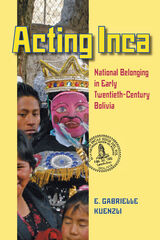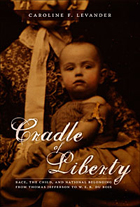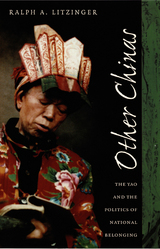
Kuenzli examines documents from the famous postwar Peñas Trial to recover Aymara testimony during what essentially became a witch hunt. She reveals that the Aymara served as both dutiful plaintiffs allied with liberals and unwitting defendants charged with wartime atrocities and instigating a race war.
To further combat their “Indian problem,” Creole liberals developed a public discourse that positioned the Inca as the only Indians worthy of national inclusion. This was justified by the Incas’ high civilization and reputation as noble conquerors, along with their current non-threatening nature. The “whitening” of Incans was a thinly veiled attempt to block the Aymara from politics, while also consolidating the power of the Liberal Party.
Kuenzli posits that despite their repression, the Aymara did not stagnate as an idle, apolitical body after the civil war. She demonstrates how the Aymara appropriated the liberal’s Indian discourse by creating theatrical productions that glorified Incan elements of the Aymara past. In this way, the Aymara were able to carve an acceptable space as “progressive Indians” in society. Kuenzli provides an extensive case study of an “Inca play” created in the Aymara town of Caracollo, which proved highly popular and helped to unify the Aymara.
As her study shows, the Amyara engaged liberal Creoles in a variety of ways at the start of the twentieth century, shaping national discourse and identity in a tradition of activism that continues to this day.

Jerng considers how adoption makes us rethink the parent-child bond as central to issues of race and nationality, showing the ways adoption also speaks to broader questions about our history and identity. He analyzes adoption through a diverse set of texts, including the 1851 Massachusetts statute that established adoption as we understand it today, early adoption manuals, the New York Times blog Relative Choices, and the work of John Tanner, Lydia Maria Child, William Faulkner, Charles Chesnutt, Chang-rae Lee, and David Henry Hwang.
Imaginative and social practices of transracial adoption have shaped major controversies, Jerng argues, from Native American removal to slavery to cold war expansionism in the twentieth century and the contemporary global market in children. As Claiming Others makes clear, understanding adoption is crucial not just to understanding the history between races in the United States, but also the meaning of emancipation and the role of family in nationhood.

Reading texts by John Adams, Thomas Paine, Harriet Beecher Stowe, Augusta J. Evans, Mark Twain, Pauline Hopkins, William James, José Martí, W. E. B. Du Bois, and others, Levander traces the child as it figures in writing about several defining events for the United States. Among these are the Revolutionary War, the U.S.-Mexican War, the Civil War, and the U.S. expulsion of Spain from the Caribbean and Cuba. She charts how the child crystallized the concept of self—a self who could affiliate with the nation—in the early national period, and then follows the child through the rise of a school of American psychology and the period of imperialism. Demonstrating that textual representations of the child have been a potent force in shaping public opinion about race, slavery, exceptionalism, and imperialism, Cradle of Liberty shows how a powerful racial logic pervades structures of liberal democracy in the United States.

Litzinger begins by describing how during the Republican period the Yao were considered a dangerous people who preferred to consort with beasts and goblins rather than join in the making of a modern nation. He then compares this to the communist revolutionaries’ view of the Yao as impressive rebels and positive examples of subaltern agency. Litzinger shows how scholars, government workers, communist party officials, and Taoist ritual specialists have influenced the varied depictions of the Yao and, in doing so, he advances a new understanding of both the Yao and the effects of official discourse, written histories, state policy, and practices of minority empowerment. In addition to analyzing issues of ritual practice, social order, morality, and the governance of ethnic populations, Litzinger considers the Yao’s role in the cultural reforms of the 1980s. By distancing his study from romanticized depictions of minorities Litzinger is able to focus on how minority representation, struggle, and agency have influenced the history of the People’s Republic, cultural debates within contemporary Chinese society, and China’s rapidly changing role in the global order.
This book will be of interest to Asianists in both anthropology and cultural studies and should appeal more generally to scholars invested in issues of ethnic identity, minority politics, and transnationalism.
READERS
Browse our collection.
PUBLISHERS
See BiblioVault's publisher services.
STUDENT SERVICES
Files for college accessibility offices.
UChicago Accessibility Resources
home | accessibility | search | about | contact us
BiblioVault ® 2001 - 2024
The University of Chicago Press









